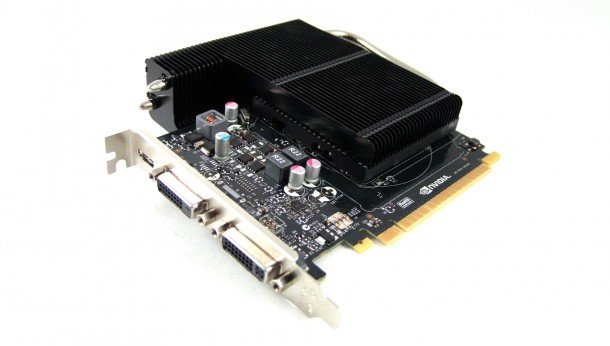How I got my GTX 750 Ti running silently with an old cooler and some simple surgery

I've spent a lot of time recently playing around with some old hardware to see if any old parts still have use. Thanks to a mixture of Nvidia's latest Maxwell GPU, in GTX 750 Ti reference form, and an expired Sapphire HD 6670 Ultimate I found something very good indeed: an efficient, relatively powerful, silent gaming graphics card.
One of the best things about the new 28nm Maxwell GPU, GM107, is that as well as being incredibly low-power for the sort of gaming performance it can generate, it runs cool. The reference board I received at launch will happily push 100% GPU load and not saunter past 54ºC. Compared with the competing AMD R7 260X running up to 83ºC, that's very cool indeed.
That's all well and good with a whirring active air-cooler strapped to the top of the GPU, but if it's so chilled what about passive-cooling? At the moment there aren't any passively-cooled GTX 750 Ti cards on the market, which is a serious shame as, a quick switch of chip-chiller with the aforementioned Sapphire HD 6670 Ultimate later, I was able to fashion my very own.
Thankfully the Sapphire cooler fits snugly on the Nvidia reference board, which meant I had no extra drilling to do on my precious GTX 750 Ti circuit board. All it needed was a little thermal paste and some work with a screwdriver. With the passive Sapphire cooler in-place the GTX 750 Ti was running considerably hotter than with the more-traditional active air-cooler atop it. But still, it was just bouncing around the 80ºC point and didn't even threaten to throttle back the GPU in-game.
I was able to get the exact same benchmark figures as I previously squeezed out of the card with the reference cooler whirring on top of it, but this time it was absolutely silent. Combine that silent running with the fact that the reference card needs no external PCIe power connectors and I've found myself with quite an exceptional gaming card for my little lounge PC. A traditional word of warning before the screwdrivers come out, messing with your setup can void a card's warranty, and hotter-than-intended (albeit silent) running might shorten the lifespan of a card.
Keep up to date with the most important stories and the best deals, as picked by the PC Gamer team.

Dave has been gaming since the days of Zaxxon and Lady Bug on the Colecovision, and code books for the Commodore Vic 20 (Death Race 2000!). He built his first gaming PC at the tender age of 16, and finally finished bug-fixing the Cyrix-based system around a year later. When he dropped it out of the window. He first started writing for Official PlayStation Magazine and Xbox World many decades ago, then moved onto PC Format full-time, then PC Gamer, TechRadar, and T3 among others. Now he's back, writing about the nightmarish graphics card market, CPUs with more cores than sense, gaming laptops hotter than the sun, and SSDs more capacious than a Cybertruck.

